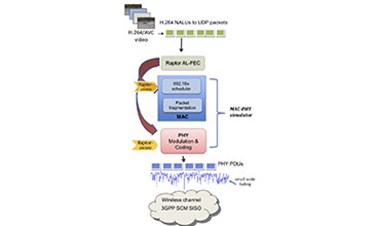Can Video Streaming Over Mobile Broadband Networks Be Improved?

Due to the increase in smartphone video applications, mobile video traffic is rising significantly. New research has shown how videos can be better transmitted over wireless links such as Wi-Fi and 4G.
The study by Professor Andrew Nix and Dr Victoria Sgardoni from the University of Bristol’s Communication Systems & Networks group is published in the journal, IEEE Transactions for Mobile Computing.
It is well known that video dominates Internet traffic and by 2018 it is expected wired devices will account for 39 per cent of Internet Protocol (IP) traffic, while Wi-Fi and mobile devices will account for 61 per cent of IP traffic.
The researchers propose a new approach for high-quality video transmission over wireless links. As shown in the cross-layer system simulator figure, they suggest cross-packet forward error correction (FEC) codes, such as Raptor codes, are applied at the application layer (AL) to allow the AL decoder to regenerate packets that were lost over the radio and network layers.
The paper explains how the adaptation of the radio layer depends on the parameters of the application layer coding, through Raptor-aware Link Adaptation and a cross-layer optimisation approach.
The proposed methodology takes into consideration the channel resources required to accommodate the Raptor overheads. Simulation results show that packet loss is eliminated and the amount of radio resource required to transport video is reduced significantly. Automatic Repeat Request (ARQ) based unicast systems require up to 115.6 per cent more channel resources, by comparison to the researchers proposed Raptor-aware LA system without retransmissions.
Furthermore, the Raptor-aware LA system can enhance the link budget by up to 4dB, (increasing radio coverage by up to 58 per cent), and can improve total goodput by 46.7 per cent compared to a traditional ARQ-based system.
The research shows that this approach increases the transmission efficiency for unicast streaming of high quality live video, while the video is delivered error-free.
Andrew Nix, Professor of Wireless Communication Systems and Head of the Department of Electrical and Electronic Engineering, said: “Given the data crunch that is occurring in current and future networks, and the fact that video is the dominant application, this work has the potential for considerable impact.”
Paper: Raptor code-aware link adaptation for spectrally efficient unicast video streaming over mobile broadband networks, Victoria Sgardoni, Member, IEEE, and Andrew R. Nix, IEEE Transactions on Mobile Computing, early access article 19 June 2014.
Source: University of Bristol
